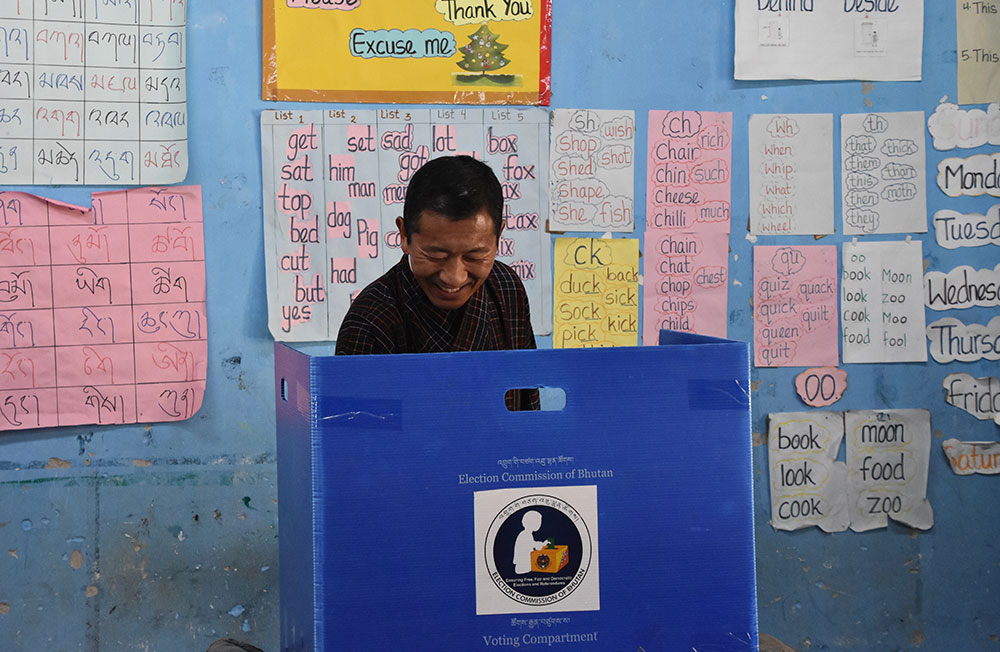Thukten Zangpo
Securing the fourth highest votes among the five parties, the Druk Nyamrup Tshogpa (DNT) is out of the race for the National Assembly general election 2023-24.
The party won only two seats from 47 constituencies, South Thimphu, the constituency of the party’s president and former prime minister, Dr Lotay Tshering, and Khatoed-Laya in Gasa. Five years ago, in 2018, DNT formed the government by winning 30 constituencies.
Dr Lotay Tshering said, “As a surgeon, I was prepared for any outcome. Elections are a game of numbers, and the party that secures a higher count prevails. I wholeheartedly accept the results.”
He said that DNT entered the election with lots of excitement to win, and never uttered about the party pledges during the campaign but about transforming and reforming the country’s system focusing on long-term goals. “Business as usual is not enough.”
Dr Lotay Tshering said that some of the government’s bold decisions like transformations in civil service, property tax, Covid-19 strict measures among others were not welcoming for the people. However, he said that these initiatives and decisions are what the future of the country needs. “My footprint during the governance was the whole national transformation.”
However, Dr Lotay Tshering said that the other political parties capitalise on these decisions to garner the votes but negatively and it is the nature of politics
Is it the anti-incumbency factor?
Observers say that DNT was an unlucky party whose term coincided with the Covid-19 pandemic that impacted lives and livelihood. Despite the DNT government’s success in effectively managing the Covid-19 crisis, an example of pandemic management, its impact on the economy, particularly the private or business sector, made people vote for change.
In managing the pandemic, strict and unpopular measures had to be put in at the cost of business. The global supply chain disruptions, inflation, decline in foreign currency reserves and consequently the government suspended vehicle imports, construction materials and loans, impacted businesses.
Campaigning for continuity, Dr Lotay Tshering tried to convince the electorate for the stern measures the government was forced to take to contain the pandemic. Lives before livelihood was the priority which the DNT government managed successfully.
However, all was forgotten as Bhutan contained the pandemic, people were vaccinated and the focus shifted on the economy.
Many started questioning the government’s decision from simple things like the closure of drayangs, affecting around 900 employees in 60 drayangs to doing away with cut-off points for class X students, affecting private schools providing admissions to class XI students.
The revision of property tax, untouched since 1992, even if it was a bold decision backfired with many questioning the decision while political parties took it up as a campaign point.
Tourism sector reopening in September last year came with a substantial sustainable development fee hike, from USD 65 to USD 200 per person per night for tourists. Those in the tourism sector opposed it tooth and nail with the 2023-24 elections as their only way to get back to the government.
The economic disruptions induced by Covid-19 pandemic resulted in numerous cases of loan defaults, with financial reforms addressing non-performing loans through legal processes, including property seizures and moratorium, which the private sector saw as a big hurdle.
When asked about Sonam Kinga joining the party and whether it reduced the chances of the party’s victory, Dr Lotay Tshering said, “Absolutely not,” and commented that there will be people who will dislike the party. “Every individual has strengths and weaknesses.”
On the eve of the election result declaration, Dr Lotay Tshering acknowledged the challenges the DNT had to face because of the pandemic and geopolitical situations. That he served Bhutan during the roughest patch in Bhutan’s history, resulting from pandemic and subsequent geo-political situations, did not matter.
Observers say that what DNT took as a fortune – like the transformation in the civil service – did not bode well with the voters. The civil service, DHI and SOE salary revisions angered those in the private sector, said one.
In a Facebook post, Dr Lotay Tshering apologised for the changes that affected many individuals, but his explanation of Bhutan being on a crossroad, of being at the most crucial phase with changes has not convinced people.
The high attrition rate in the civil service, attributed to the transformation exercise, led to DNT paying the price for disgruntling civil and public servants.
What’s next?
Dr Lotay Tshering said that the DNT would watch the buildup for two parties closely in the general election. He added that until the primary election results, the party had considered voting solely for DNT but now must choose one of the winning parties with full support.
“I feel sad, not for losing, but for missing the opportunity of one more month to talk to the country about what they should hear and know—not what they want to hear,” he said. “I wish every day DNT was one of the two parties winning.”
Dr Lotay Tshering added that whichever party comes to power, he hopes the party sees through the national transformative initiative and reaches the intended destination.
Moving forward, he expressed a lack of control over what other parties say, emphasising that if campaign promises are implemented during governance, many reforms would be deconstructed. He emphasised that no one in this election talked about the milestone National Digital Identity initiative, as Bhutan has made history globally by having an NDI backed by an Act of Parliament.
Regarding a potential comeback in the 2029 election, Dr Lotay Tshering indicated a willingness to study the situation and participate if deemed necessary. However, he clarified that participation would not be for showcasing but driven by a genuine need and purpose.


